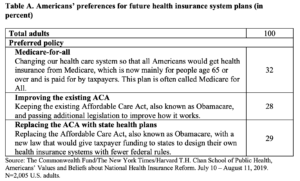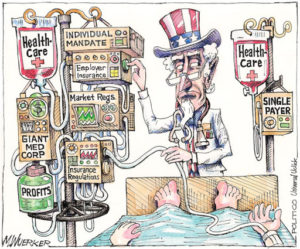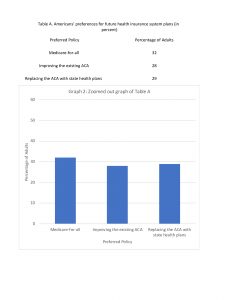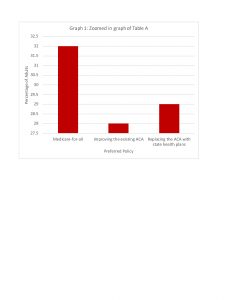Sociological Views
In order to cure the U.S. healthcare system, one must first identify the ailment with the help of sociological theories. Each theory offers a unique perspective and explanation for the same problem. For instance, the conflict and functionalist viewpoints offer different views about the role of a failing healthcare system in society and how individuals will react to it.
The conflict perspective:
After originating from Karl Marx’s ideas, the conflict perspective has become one of the four major standpoints of Social Science. This theory divides society into two layers that are locked in a perpetual war. The politically powerful rich, Bourgeoisie class, exploit the politically weak workers/laborers, Proletariat class, that will unite to uprise against the Bourgeoisie class with political reforms. Furthermore, there is no end to this cycle under the capitalist economy. According to the sociology professor, Anna Leon-Guerrero, when the conflict perspective is used to view the U.S. medical system, it is possible to argue, “our medical industry is based on a capitalist system, founded not on the value of human life but on a pure profit motive.”(1) In other words, the ineffective healthcare system of the U.S. functions as a profit generator for the Bourgeoisie at the expense of the Proletariats. Furthermore, the Bourgeoisie have the finances required to pay for the expensive health insurance, but the Proletariats struggle to pay the bills. However, the Proletariats are aware of the flawed system and have various reform ideas. For instance, the single-payer healthcare plan, where the government would pay for all medical expenses from taxes, has been circulating for a while. Unfortunately, this is where Karl Marx’s ideas deviate from the reality of the situation. To clarify, the conflict perspective states that unity among the Proletariat class is necessary to overpower the Bourgeoisie, but the American people have yet to unite on a healthcare plan. According to a study done for Harvard T. H. Chan School of Public Health, The New York Times, and The Common Wealth Fund, only thirty-two percent of the adults that conducted the survey voted for the single-payer healthcare plan (2). While thirty-two percent is a decent percentage, it is nowhere near the unified Proletariat force that Karl Marx envisioned. The U.S. is not stuck with its current medicare system, however, because the worse conditions get the more likely Americans are to rally behind a common cause.

The functionalist viewpoint:
On the other hand, Functionalism originated from Auguste Comte’s ideas and has been defined by the American education technology company, Chegg, as a sociological viewpoint where, “every single part of society serves a purpose to help that society function properly and in the best way possible”(3). In other words, society is a cohort of different parts that work together to achieve some form of balance. In the case of healthcare, some Functionalists suggest that the costliness of healthcare acts as a form of a motivator for people to work hard and seek better jobs in order to be able to pay their medical bills. Another liable option is that the cost of health care acts as a natural cation sign that encourages individuals to make safe decisions that will not cost them a substantial medical bill. Lastly, functionalists can also argue that society is in a state of instability because of the dysfunctional healthcare system, which is why people are rallying behind various healthcare plans as an effort to restore balance.

My personal opinion:
Personally, I lean towards the conflict perspective and away from the functionalist viewpoint. For starters, it is true that the rich have no problems paying the bills heaped upon them by the current medical system and that most of the individuals bankrupted by are middle or lower class citizens. Moreover, the middle and lower class advocate for changes to be made to the current system. Nevertheless, the division of Americans into Bourgeoisie and Proletariats is unrealistic. There are some rich individuals that want an improved healthcare system and a handful of working-class citizens will resist change no matter what. The functionalist viewpoint seems less likely to me, but the upper class has used the tensions within the middle class to their advantage before. However, it is difficult to maintain this strategy for extended periods of time. To sum up, I believe that the conflict perspective aligns more with the reality of the matter than the functionalist viewpoint.


Footnotes:
- Leon-Guerrero, Anna. Social Problems: Community, Policy and Social Action. 6th ed. Thousand Oaks, CA: SAGE Publications, Inc., 2019.
- “Americans’ Values And Beliefs About National Health Insurance Reform.” Americans’ Values And Beliefs About National Health Insurance Reform. Harvard T. H. Chan School of Public Health, The New York Times, and The Common Wealth Fund, October 2019. https://cdn1.sph.harvard.edu/wp-content/uploads/sites/94/2019/10/CMWF-NYT-Harvard_Final-Report_Oct2019.pdf.
- Functionalism | Sociology | Chegg Tutors. Functionalism | Sociology | Chegg Tutors. Chegg, 2016. https://www.citationmachine.net/chicago/cite-a-film/manual.
